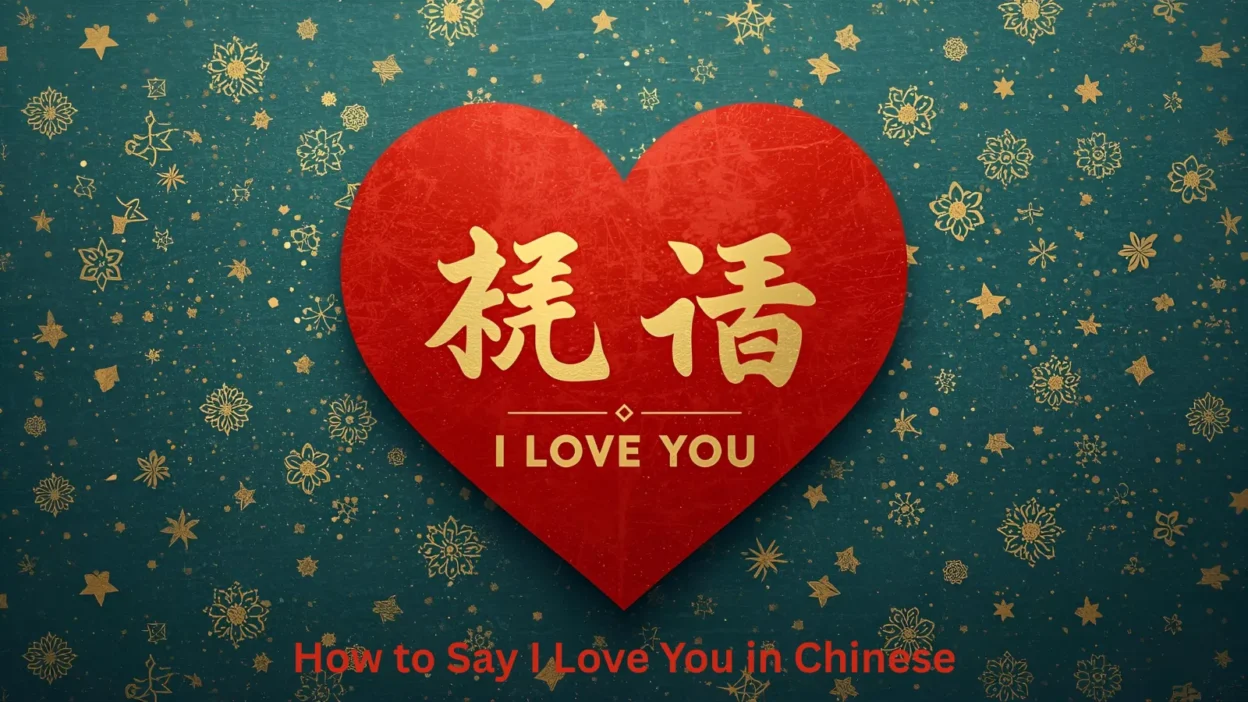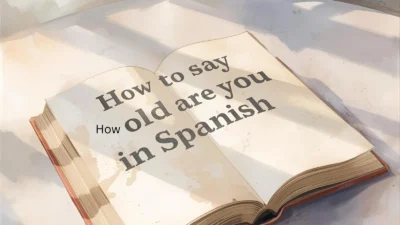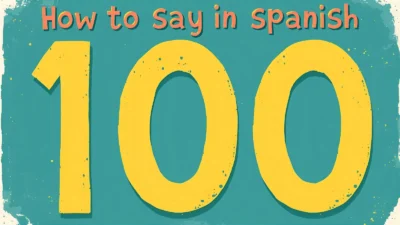Learning how to say I love you in Chinese is a beautiful way to express deep feelings in one of the world’s most spoken languages. The most common phrase is “wǒ ài nǐ” (我爱你), which directly translates to I love you.
Knowing this phrase not only strengthens personal connections but also helps you appreciate Chinese culture and its unique way of expressing emotions.
Saying it with the right tone makes your words sound heartfelt and genuine. Plus, you’ll be able to connect more meaningfully with native speakers in personal and romantic settings.
I Love You in Chinese
✅ 15 Phrases Table
| No. | Chinese Phrase | Pinyin | English Meaning |
|---|---|---|---|
| 1 | 我爱你 | Wǒ ài nǐ | I love you |
| 2 | 我喜欢你 | Wǒ xǐhuān nǐ | I like you |
| 3 | 我很想你 | Wǒ hěn xiǎng nǐ | I miss you a lot |
| 4 | 你是我的唯一 | Nǐ shì wǒ de wéiyī | You are my only one |
| 5 | 我爱上你了 | Wǒ ài shàng nǐ le | I’ve fallen in love with you |
| 6 | 你对我很重要 | Nǐ duì wǒ hěn zhòngyào | You are very important to me |
| 7 | 我永远爱你 | Wǒ yǒngyuǎn ài nǐ | I’ll love you forever |
| 8 | 你是我的一切 | Nǐ shì wǒ de yīqiè | You are my everything |
| 9 | 我对你有感觉 | Wǒ duì nǐ yǒu gǎnjué | I have feelings for you |
| 10 | 你是我的幸福 | Nǐ shì wǒ de xìngfú | You are my happiness |
| 11 | 我珍惜你 | Wǒ zhēnxī nǐ | I cherish you |
| 12 | 我心里只有你 | Wǒ xīnlǐ zhǐ yǒu nǐ | You’re the only one in my heart |
| 13 | 我对你很在乎 | Wǒ duì nǐ hěn zàihu | I care about you a lot |
| 14 | 你是我的爱人 | Nǐ shì wǒ de àirén | You are my lover |
| 15 | 爱你一万年 | Ài nǐ yí wàn nián | Love you for ten thousand years (poetic) |
Here are 15 ways to say I love you in Chinese — complete with conversations and the cultural meaning behind each one.
1. 我爱你 (Wǒ ài nǐ) – I love you

Origin:
This is the direct translation of “I love you,” but it’s actually not used as frequently in everyday Chinese conversations as it is in Western culture. It’s considered very serious and intimate.
Example:
👤 User A: 我爱你。
👤 User B: 我也爱你。💖
Use: Deep romantic love, often in committed relationships or serious moments like proposals.
2. 我喜欢你 (Wǒ xǐ huān nǐ) – I like you
Origin:
More commonly used in the early stages of romance. In Chinese, liking someone is often the first real emotional step toward love.
Example:
👤 User A: 我喜欢你。
👤 User B: 真的?我也喜欢你!
Use: Early romantic interest or confessions.
3. 我对你有感觉 (Wǒ duì nǐ yǒu gǎn jué) – I have feelings for you
Origin:
This phrase expresses romantic interest without directly saying “love,” which aligns with Chinese indirect communication norms.
Example:
👤 User A: 我对你有感觉。
👤 User B: 我也是,我们试试吧。
Use: Flirting or expressing emerging feelings.
4. 我想你 (Wǒ xiǎng nǐ) – I miss you
Origin:
Missing someone is often a way of saying you love them without the pressure of the word “love.”
Example:
👤 User A: 你在干嘛?我想你了。
👤 User B: 我也很想你!
Use: Romantic or emotional expression, often in long-distance relationships.
5. 我在乎你 (Wǒ zài hu nǐ) – I care about you

Origin:
Shows emotional investment. In Chinese culture, caring is often more meaningful than grand declarations.
Example:
👤 User A: 别做危险的事,我在乎你。
👤 User B: 谢谢你,你真的对我很好。
Use: Tender, emotional connection; could be romantic or close friendship.
6. 我离不开你 (Wǒ lí bù kāi nǐ) – I can’t live without you
Origin:
This dramatic expression of attachment is often found in Chinese love songs and dramas.
Example:
👤 User A: 我真的离不开你。
👤 User B: 我也一样。
Use: Serious romantic relationships, dramatic or poetic tone.
7. 你是我的唯一 (Nǐ shì wǒ de wéiyī) – You are my only one
Origin:
A poetic and emotional phrase, often used in romantic movies or confessions.
Example:
👤 User A: 你是我的唯一。
👤 User B: 我愿意一直陪你。
Use: Deep love or proposals.
8. 我愿意陪你一辈子 (Wǒ yuàn yì péi nǐ yí bèi zi) – I want to be with you forever
Origin:
This emphasizes long-term commitment, echoing traditional Chinese views on lifelong partnerships.
Example:
👤 User A: 我愿意陪你一辈子。
👤 User B: 你真让我感动。
Use: Marriage or lifelong commitment.
9. 我想和你在一起 (Wǒ xiǎng hé nǐ zài yì qǐ) – I want to be with you

Origin:
Soft and sweet way of expressing your desire to be in a relationship.
Example:
👤 User A: 我想和你在一起。
👤 User B: 好啊,我也早就想说了。
Use: Starting a relationship or confessing affection.
10. 你在我心里最重要 (Nǐ zài wǒ xīn lǐ zuì zhòng yào) – You are the most important person in my heart
Origin:
Shows emotional priority, often used to comfort or assure someone.
Example:
👤 User A: 你知道吗?你在我心里最重要。
👤 User B: 我听了好开心!
Use: Emotional support and love.
11. 为你我愿意做任何事 (Wèi nǐ wǒ yuàn yì zuò rènhé shì) – I’d do anything for you
Origin:
Classic romantic sentiment found in Chinese dramas and love letters.
Example:
👤 User A: 为你我愿意做任何事。
👤 User B: 你对我太好了!
Use: Strong devotion or romantic dedication.
12. 宝贝 (Bǎo bèi) – Baby / Darling
Origin:
“宝贝” literally means “treasure” and is widely used in romantic and familial love.
Example:
👤 User A: 宝贝,晚安,做个好梦。
👤 User B: 晚安,亲爱的!
Use: Romantic pet name.
13. 亲爱的 (Qīn ài de) – Dear / Honey
Origin:
Used in letters and as a spoken term of endearment, especially among couples.
Example:
👤 User A: 亲爱的,今天过得怎么样?
👤 User B: 忙了一天,听到你声音就好了。
Use: Common in married or long-term couples.
14. 你是我的全世界 (Nǐ shì wǒ de quán shì jiè) – You are my whole world
Origin:
Very emotional, used for strong romantic declarations, often in lyrics and drama.
Example:
👤 User A: 你是我的全世界。
👤 User B: 永远不要离开我,好吗?
Use: Deep romantic or poetic expression.
15. 我愿意 (Wǒ yuàn yì) – I do / I’m willing
Origin:
Popularized by Faye Wong’s classic love song “我愿意.” These words carry weight, especially in response to proposals or declarations.
Example:
👤 User A: 你愿意嫁给我吗?
👤 User B: 我愿意。💍
Use: Used in wedding vows or confessions.
Conclusion:
Learning how to say I love you in Chinese goes beyond memorizing words—it’s about expressing emotions in a culturally meaningful way. Whether you use the classic “wǒ ài nǐ”, a poetic expression, or a casual phrase, each version shows love in its own unique style. By practicing these phrases, you’ll not only strengthen relationships but also gain a deeper appreciation for Chinese language and culture.

Sophia Mitchell is a passionate content writer known for creating clear, engaging, and informative articles.
She focuses on delivering well-structured content that is easy for readers to understand and trust.
Sophia Mitchell currently contributes quality writing to repliesnest.com, helping readers find accurate answers quickly.



